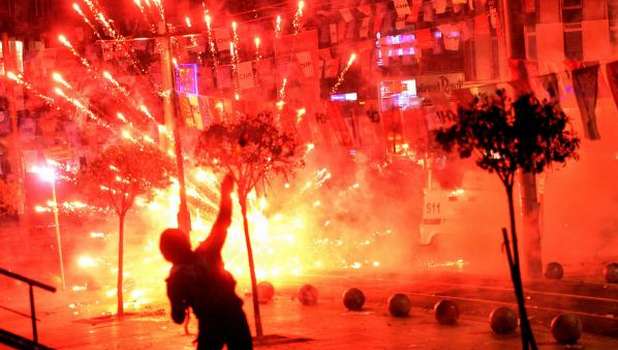The possibility that the Turkish government will change its position regarding the Muslim Brotherhood in the Arab world has been ruled out, at least for the time being, after the local elections which reasserted the popularity of the leader of the Justice and Development Party, Prime Minister Recep Tayyip Erdoğan. Erdoğan identifies with the Brotherhood in Egypt to the extent that their fates are linked. His own confrontation with the Turkish military establishment, which continues to interfere with his rule, is a basis for his intense opposition to the ‘coup’ against Mohamed Mursi’s government in Cairo and the overthrow of the legitimacy of the ballot box.
Given the timing of the rebellion against Mursi last July and the youth uprising in Istanbul last spring, it is not surprising that Erdoğan should see a connection between the revolt in Egypt and the upheaval in Taksim Square, since the Turkish uprising targeted him personally.
But there is another side to the relationship with the Muslim Brotherhood. Some view the Turkish–Egyptian axis as a means of containing the expansion of Iranian influence in the Arab world. Moreover, this alliance compensates for the setbacks that have struck Turkish diplomacy in Syria and Iraq. From this perspective, the approach can be seen not as an emotional one, but rather as something calculated and rational, which puts the ties to the Brotherhood in their appropriate light: the policy of ‘zero problems’ with neighbors, as drawn up by foreign minister Dr. Ahmet Davutoğlu, the engineer of Turkish foreign policy in the Arab world.
It appears that this policy is in urgent need of radical revision, in order to address the causes of the transformation from ‘zero problems’ to ‘severe problems.’ This twist has become evident in the decline in Turkish foreign relations, Turkey’s exposure to the turmoil experienced by most countries in the region, and moribund Turkish–Israeli relations. The situation makes the policy of ‘new Ottomanism’ merely a passing fancy, as long as Turkish policies do not adapt to the chaotic transitional period that continues to rock Arab societies, as well as political transformations in Tunisia, Egypt, Libya, Yemen and Syria.
The outcome thus far has been sufficient for Turkey to maintain a solid economic base and sometimes appear as a dynamic diplomatic actor, but it still needs to seek new horizons for its declining political role in the area. This must happen through the exercise of both political will and a dynamic vision for addressing both the deep Sunni–Shi’ite rift and the Turkish–Kurdish rift.
The Arab revolutions and geopolitical transformations resulting therein have put forth a new challenge for Turkey in terms of testing its soft power. The protest movement that swept the region in 2011 put the credibility of the ‘good neighbor’ policy on the line, as well as the rapprochement that Davutoğlu promoted with the slogan ‘reducing problems.’ This was adopted as a means of documenting ties with the Arab leaders who were the targets of protest movements that began at the end of 2010. This suggests that Turkey bet on the regional status quo and did not anticipate the Arab uprisings that have caused a systemic crisis in the region.
In light of recent events, there is no longer any doubt that the transitional phase in the Arab world changed the face of the region, to the extent that the expression ‘reducing problems’ has become inapplicable. The phrase will no longer be promoted, thanks to the rapid fluctuations that have resulted from the uprisings and Arab protest movements. This may be due to a confused Turkish response throughout the Syrian crisis, in the absence of a comprehensive and dynamic approach to a region in the midst of democratic transitions and new trends.
The counterpoint to this article can be read here.

Inspite of that you should be proud of your closest mature democracy in this region, when the entire Arab world is struggling for gaining a bit of breathing space for long desired democracy to materialise their opinion.Turkey is a big regional power with a sizable GDP,manpower,landvariety and water resource with a diversified economic projection that may exert it,s potentials for socio-economic and cultural development of this region.